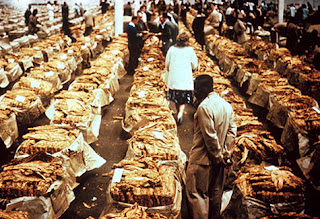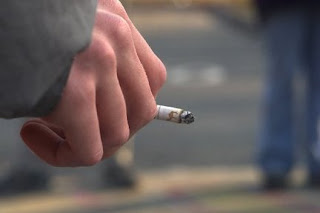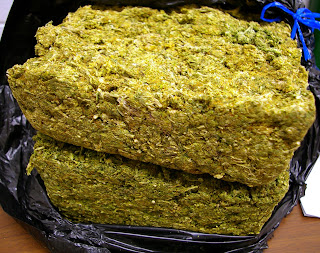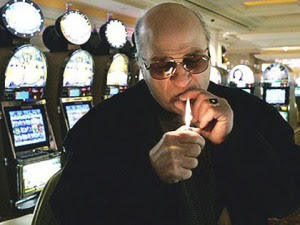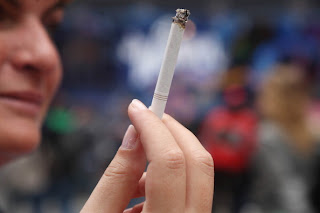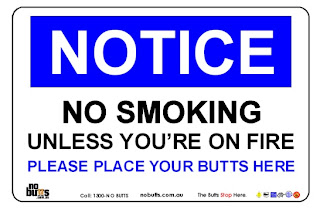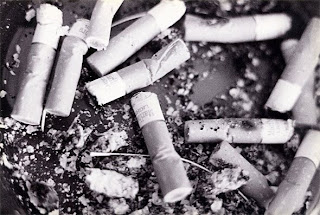
Since he became the owner of the Main Bar nearly 19 years ago, Allan Leier said he’s seen a steady increase in his business every year. But all that came to an end last April when Bismarck’s ban on smoking in bars took effect.
“When this thing started, we were off by 40 to 50 percent, and then it leveled off,” Leier said. “Now we’re right at between 32 and 38 percent down every month. I can compare by going back 3 years and I can compare day by day – same day last year, same day two years ago – and I’ve got the numbers to prove it.”
Approximately 65 percent of Bismarck voters supported the ban on smoking in bars when it was on the ballot last March. The stated goal was to create a healthier environment for bar employees and patrons.
Leier said the results may have helped his lungs, but they have definitely hurt his wallet.
“The voters were voting for a smoking ban or a tobacco ban, not to put me out of business. I don’t believe they were doing that,” Leier said. “But it’s a big cut in pay, it’s a very big cut in pay.”
Down the street a few blocks, Brian Hill, owner of Lucky’s Bar, is facing a similar situation. Hill said not only has he lost business due to the smoking ban, but his employees are also making less money.
“It’s one thing when I’m losing money, but when my staff, who depend on their tips – it’s the tips that’s the important thing – and when they don’t have the sales they aren’t getting the tips so they’re hurt,” Hill said.
Hill said he’s spoken with other bar owners about the financial effects of the smoking ban, and what he’s heard isn’t good.
For this story, the Great Plains Examiner interviewed bar owners and bartenders at several Bismarck and Mandan bars to find out what they’ve been experiencing since the smoking ban went into effect. Of the 13 Bismarck bars contacted, a majority said business went down immediately after the ban went into effect. After about 10 months with the ban, eight of the 13 bar owners said their business was still down. Four said it has either rebounded or is about the same as it was pre-ban, and one bar owner said business has actually been up.
“There was some uncertainty when it went into effect, but it hasn’t hurt me,” said Brad Erickson, owner of Borrowed Bucks Roadhouse.
Pat McGeary, the coordinator of the Bismarck Tobacco Free Coalition, the group that spearheaded the smoking ban in bars, said the decline in business at Bismarck bars is surprising and was never the intent of the ban. She cautioned, however, that no official statistics have been tallied to show the actual financial effect in Bismarck.
“We looked at the economic studies that are done with sales tax data from cities nationally that have done smoke-free ordinances and smoke-free laws, and there is no study out there that shows there was a negative impact,” McGeary said. “So we felt confident that Bismarck would not be unlike any other city nationally and there should be no dire economic consequences from moving ahead.”
McGeary said the intent of the ordinance was simple.
“We visited with people who recreate in bars, and who work in bars and April 27 (the day the ordinance went into effect) changed their job forever, in a good way. No more asthma inhalers, no more eye drops,” McGeary said. “Second-hand smoke is deadly. You’re working in irritants and cardio-toxic compounds and carcinogens. The goal of the ordinance, number one, was to protect the health of our workers and citizens from heart disease and lung cancer.”
April 27 was also a memorable day for Mandan bars.
“We’ve seen a lot of new faces in here since the smoking ban went into effect in Bismarck. Business has definitely picked up.” said B.J. Stockert, bartender at the Colonial Lounge.
“We noticed a big jump right after it took effect. It’s come back down a little bit since then, but our sales have been about 20 percent higher than normal.” said Jason Bauer, co-owner at the Colonial Lounge.
Of the eight Mandan bars contacted by the Great Plains Examiner, five said business has gone up since the Bismarck smoking ban went into effect. The three others said business has stayed about the same.
That rise in business in Mandan bars can be traced back to customers crossing the Missouri River in order to be able to smoke while they enjoy their favorite beverage.
Larry Sauter, a 57-year-old Bismarck resident, said he used to be a regular at Chips Bar and Casino in Bismarck. He frequented the bar a “couple of times a week” until the citywide smoking ban took effect. Now, he drives to the Colonial, where he can smoke indoors.
“People who smoke will find a new place to nest, like I did,” Sauter said. “These bars on the Strip aren’t that far away anyway, and if it means they can smoke without freezing their butts off during the winter, that’s where they’re going to wind up.”
At Lucky’s Bar in Bismarck, Hill said the mild winter we’ve had has helped keep some of the smokers at his bar, but he has talked to a number of his regular customers who have decided to go elsewhere.
“Lots of them, they just flat go to Mandan or stay home, especially in the beginning. We’re doing a little better, but the main reason we’re doing a little better is because of the weather,” Hill said. “If they had to stand outside in the snow and smoke, I’m quite sure we wouldn’t have a lot of the business we’ve managed to have this winter.”
Hill also owns Polar Package Place liquor store right next door to Lucky’s. He said sales are up at the liquor store because customers who used to frequent the bars are instead picking up off-sale to drink at home where they can smoke.
“I’m in a little bit different scenario than some of the bars. I can fall back on the liquor store side to pick up the business for the people that are taking alcohol home,” Hill said.
Al Leier of the Main Bar said proponents of the ban claimed new customers would come out to the bars if they didn’t have to deal with all the smoke. Leier said that simply hasn’t happened.
“Yeah my bar is a lot cleaner, it doesn’t smell from smoke,” Leier said. “But the 65 percent that voted for this, those people weren’t going to bars, it didn’t affect them in the first place because they weren’t going to these places like mine.”
Leier said the ban isn’t saving any lives like supporters claim – it’s just having an impact on his pocketbook and other small bar owners like him. It is also having an impact on the local environment.
“If you’d like to step out my back door and look at the mess out back, that mess used to be cleaned up. It was never out there. The wind blows and it blows that mess all around town, it used to be in here and I took care of it,” Leier said.
Hill said he’s having a similar problem at Lucky’s.
“Now if they want a cigarette, they’re outside, and half of them out of spite just throw them on the ground,” Hill said. “We try to keep them swept up, and we’ve got buckets out there filled with sand to put them in, but all the cigarettes end up getting washed down the storm sewer if we get a good rain and out into the Missouri River. How pleasant is that?”
Hill said he doesn’t want anyone to feel sorry for him, he’s facing the same thing a lot of other bars in Bismarck are up against. He said it’s how you deal with the change and how you treat your employees and customers that will define your business.
“We just do everything in our power to put the best people in the right places to make sure our service is top notch and try and keep every customer that we get,” Hill said. “It’s play by ear right now, I’m not necessarily sure if it’s over or not, but either way the cost to us, when it all gets added up, has been terrible.”
